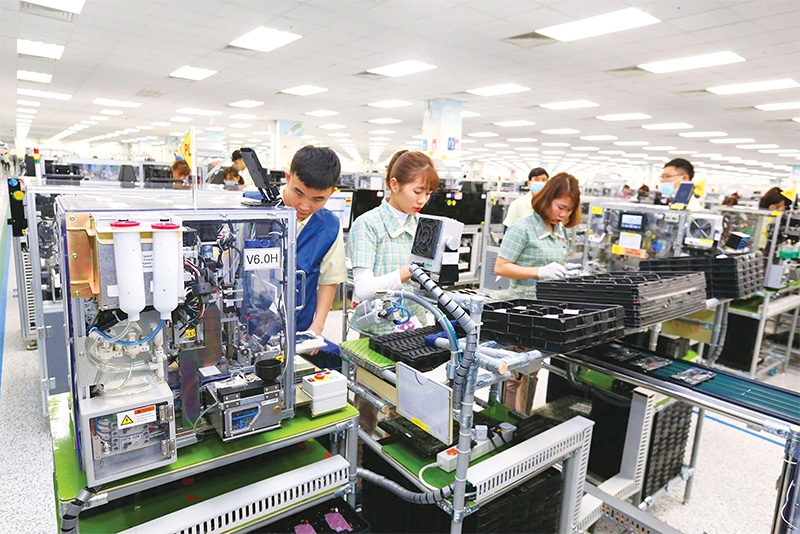Industrial production on track across Thai Nguyen
 |
| Thai Nguyen-based companies’ performance has markedly improved in the last two months |
According to figures from Thai Nguyen’s Department of Industry and Trade, in the first nine months of 2020, the total industrial gross output in the province hit an estimated VND567.6 trillion ($24.67 billion), up 2.5 per cent on-year and equal to 70.7 per cent of the full-year plan.
Along with this, the domestic economic sector achieved VND41.5 trillion ($1.8 billion), up 5.4 per cent on-year and reaching 72.5 per cent of the annual plan. Meanwhile, foreign-invested enterprises (FIEs) posted VND526 trillion ($22.8 billion), equal to 70.5 per cent of the plan and 2.3 per cent more than the same period last year.
Despite several issues relating to the COVID-19 pandemic, the provincial business community has availed of every opportunity to circumvent difficulties, striving to retain production as well as employment for their labourers.
Companies operating in electronics and high-tech fields have fared the best, particularly in laptops amounting to 14.7 million units, a 16.4 per cent jump on-year; earphones at 29.9 million units, up 5.5 per cent; and integrated electronic circuits at 82.5 million units, up 1 per cent.
Duong Thi Van, Trade Union chairwoman at Jukwang Precision Vietnam based in Diem Thuy Industrial Park, said that the complexity of the coronavirus pandemic in such markets as China and South Korea was hurting Vietnam’s export business.
The company, which specialises in the production and export of phone components and moulds to both countries, is sparing no efforts in seeking new export orders and studying the production of new models fitting domestic market demands.
Consequently, in the first three quarters, Jukwang Precision Vietnam’s gross output surpassed 60 per cent of the full-year plan, similar to that in the corresponding period last year.
Meanwhile, South Korean-owned touchscreen maker SAMJU VINA Co., Ltd. said that it has maintained stable production all year, and has sold more than 20 million units per month, reaching 90 per cent of its 2020 objectives.
A company representative reported that the company has injected capital into building a second plant producing touchscreens for phones, boosting its total production capacity to 35 million units per month.
Like FIEs, in recent months major local firms in diverse fields like textiles and garments, mechanical equipment, and building materials have worked out a raft of measures to remain steadfast amid the pandemic impacts.
Vu Thanh Son, head of the Market Department at Thai Nguyen Iron and Steel JSC (TISCO) said that the global health crisis brought about a standstill in steel imports, particularly related items from the Chinese market, consequently opening up great opportunities for domestic steel product consumption.
To better avail of the opportunity, the company has urged its member units to push up production and focus on the quality factor. As a result, in the first nine months of 2020, TISCO sold over 600,000 tonnes of products, reaching 75 per cent of its full-year goal and achieving a more than 10-per-cent jump on-year, generating over VND9 trillion ($391.3 million) in revenues.
In the apparel sector, major businesses like TNG Investment and Trading JSC, Vina Garment, and TDT Investment and Development JSC have gradually resumed production by 50-80 per cent compared to Vietnam’s coronavirus peak earlier in the year. The firms have signed export contracts lasting until the end of the year, paving the way to best fulfil their annual production targets.
The performance of firms based in Thai Nguyen has markedly improved in the last two months. However, due to woes, many companies, particularly small- and micro-sized ones, are still failing to stabilise production and require further support to achieve their set business targets.
In this context, to support firms towards realising their growth targets in industrial production, Thai Nguyen’s industry and trade sector has been deploying a raft of measures including joining with relevant departments, sectors, and local authorities to push up measures to attract investment projects into provincial industrial zones and clusters; supporting businesses in stabilising production and business through industrial stimulus projects and programmes; and many more besides.
Additionally, the industry and trade sector is turning to central bodies seeking priority on capital allocation to implement the sector’s major projects, particularly those on buildings industrial zones and clusters in the province, laying the bedrock to lure in investment moving forward.
What the stars mean:
★ Poor ★ ★ Promising ★★★ Good ★★★★ Very good ★★★★★ Exceptional
 Tag:
Tag:
Related Contents
Latest News
More News
- Hermes joins Long Thanh cargo terminal development (February 04, 2026 | 15:59)
- SCG enhances production and distribution in Vietnam (February 04, 2026 | 08:00)
- UNIVACCO strengthens Asia expansion with Vietnam facility (February 03, 2026 | 08:00)
- Cai Mep Ha Port project wins approval with $1.95bn investment (February 02, 2026 | 16:17)
- Repositioning Vietnam in Asia’s manufacturing race (February 02, 2026 | 16:00)
- Manufacturing growth remains solid in early 2026 (February 02, 2026 | 15:28)
- Navigating venture capital trends across the continent (February 02, 2026 | 14:00)
- Motivations to achieve high growth (February 02, 2026 | 11:00)
- Capacity and regulations among British areas of expertise in IFCs (February 02, 2026 | 09:09)
- Transition underway in German investment across Vietnam (February 02, 2026 | 08:00)






















 Mobile Version
Mobile Version